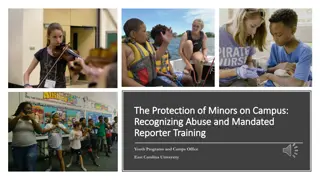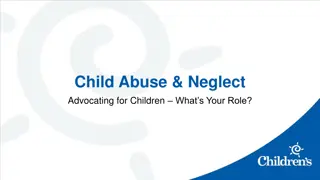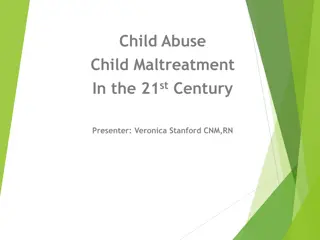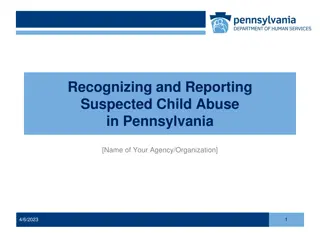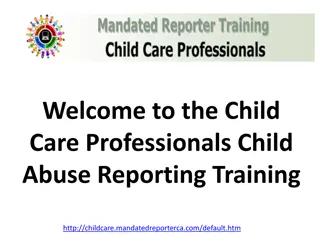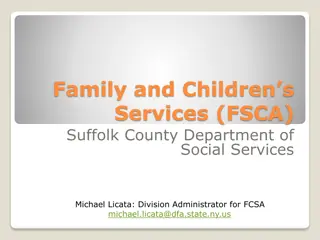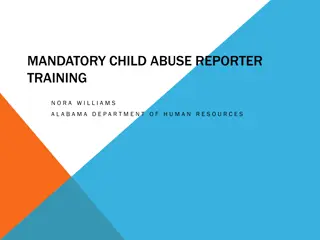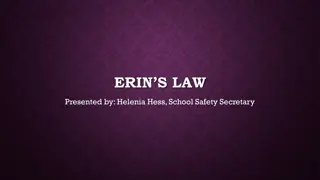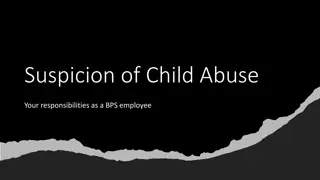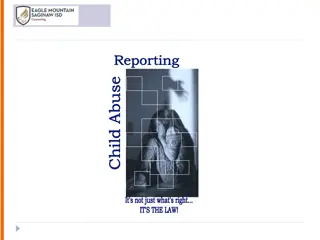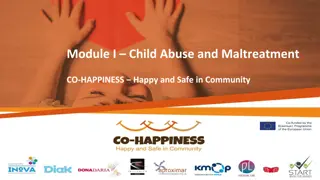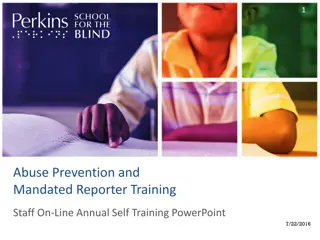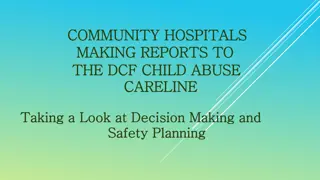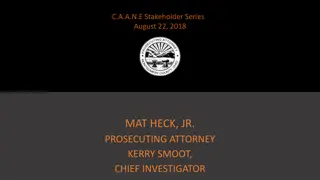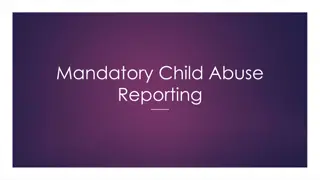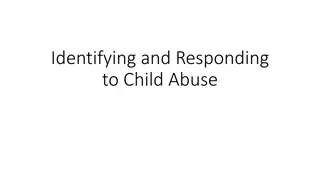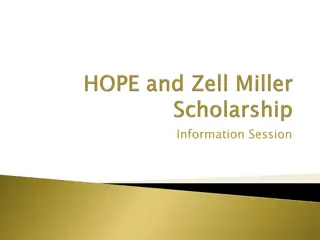Recognizing and Reporting Child Abuse in Georgia: A Guide for Mandated Reporters
Designed to help Georgia mandated reporters identify signs of child abuse and neglect, understand legal obligations for reporting, and know how to make a report. Mandated reporters play a critical role in safeguarding children's well-being by reporting suspicions of abuse and neglect to the proper authorities. Victims of abuse may experience developmental delays, health issues, emotional challenges, and more. Certain individuals are legally required to report such cases to the Georgia Division of Family and Children Services (DFCS). Mandated reporters include those who work or volunteer in agencies serving children and families, regardless of direct contact. Training is vital, and almost anyone in contact with children, including camp volunteers, is considered a mandated reporter.
Download Presentation

Please find below an Image/Link to download the presentation.
The content on the website is provided AS IS for your information and personal use only. It may not be sold, licensed, or shared on other websites without obtaining consent from the author. Download presentation by click this link. If you encounter any issues during the download, it is possible that the publisher has removed the file from their server.
E N D
Presentation Transcript
This is designed to help Georgia mandated reporters recognize the signs of child abuse and neglect, their legal obligations related to reporting suspected abuse and neglect and how to make the report.
If you need to report suspected child abuse or neglect call: 1-855-GA-CHILD (1-855-422-4453)
Victims of abuse are more likely to experience: 1. Developmental delays 2. Poor physical health 3. Poor emotional and mental health 4. Social difficulties 5. Poor school performance 6. Behavior problems 7. Involvement in criminal activity 8. Chronic health conditions into adulthood
Certain individuals are called mandated reporters because they are legally required to report suspected child abuse and neglect to the Georgia Division of Family and Children Services (DFCS) as required by the state's laws.
Mandated reporters are individuals who work or volunteer in agencies or organizations that serve children and families. This is a broad category to include those who have the most frequent contact with children in their professional or volunteer lives. They are often the first adults to notice signs of child abuse and neglect. They protect children who cannot protect themselves by reporting suspected child abuse or neglect to the proper authorities.
Anyone employed by or volunteering at an agency or organization providing services to children like those listed below, is a mandated reporter, even if his or her position does not involve direct contact with children. Care Treatment Education Training Supervision Coaching Counseling Recreational programs Shelter
Mandated reporters include almost everyone who comes in contact with children including volunteers at most youth programs and organizations. Per the UGA Minors on Campus Policy, all camp workers are required to complete training in this area.
Georgia code O.C.G.A.19-7-5 requires mandated reporters to contact the Division of Family and Children Services (DFCS) if they have reasonable cause to believe that a child known to them is suspected of being abused or neglected. Calls should be made to 1-855- 422-4453. In the event of an emergency, call 911.
Be clear about what your role isand is not. If you are a mandated reporter, it is your legal obligation to report your suspicions to your local county DFCS office or to your organization or agency's designated reporter. Familiarize yourself with state law on agency designated reporters (19-7- 5) and your agency's policy on reporting suspected abuse or neglect. If you do not have a policy, advocate for one to be implemented. It is not your role to investigate injuries or anything the child has told you.
DFCS has an obligation to ensure safety of children under the age of 18 who are not emancipated minors and to be available 24-7 to receive reports. DFCS, based on state law and policy, will determine if a DFCS intervention is needed. The type of intervention will vary depending on the severity of the allegation when the report is screened. DFCS may possibly provide support to the family which includes referral to community resources and/or reconnecting the family to non-professional persons that can provide support and help build the ability of the caregivers to strengthen their own families.
The first step in fulfilling your role as a mandated reporter is to recognize the main categories of abuse and neglect legally acknowledged by the Georgia Division of Family and Children Services (DFCS). These include: Physical abuse Neglect Emotional abuse* Sexual abuse Sexual exploitation For each type, we will look at both the physical indicators, or what you may see on the child's body, and the behavioral indicators, or how you may observe the child acting.
Georgia Code O.C.G.A. 19-7-5 defines physical abuse as "injury or death inflicted upon a child by a parent or caretaker other than by accidental means." Injuries as a result of physical abuse may include severe beatings, burns, bites, fractures, bruises, welts or other physical problems. Corporal punishment* is legal in Georgia. However, intentionally injuring a child is not. Spanking and any other consequences for a child's behavior should focus on disciplining rather than punishing a child. Leaving a mark or in any way harming a child is not considered discipline.
The physical indicators of physical abuse may include: Unexplained bruises and welts on face, lips, mouth, torso, back, buttocks or thighs Bruises and welts may be in various stages of healing, clustered, or form patterns Bite marks Unexplained fractures or dislocations Unexplained burns or burns in the shape of an object Bald patches on the scalp High or frequent incidence of "accidents"
The behavioral indicators of physical abuse may include: Extreme vigilance or watchfulness Frightened of parents or caregivers Afraid to go home Poor social interactions Bullying smaller children Acts out inappropriately with dolls or stuffed animals Poor self-concept
Every mandated reporter should be aware of common signs of parental drug abuse and make a report if there is suspected child abuse. Some common signs include: Sudden change in behavior or odd or irrational behavior Impaired thinking, confusion and nervousness Withdrawal from family and friends Lack of personal grooming or poor hygiene Red or glassy eyes Extreme weight loss
Neglect occurs when a parent or caretaker allows a child to experience avoidable suffering or fails to provide basic essentials for physical, social, and emotional development.
The physical indicatorsof neglect may include: Underweight, poor growth patterns, failure to thrive Poor hygiene Inappropriate dress Consistent hunger Evidence of no or poor supervision Unattended physical problems or medical or dental needs
The behavioral indicatorsof neglect may include: Begging, stealing, or hoarding food in pockets or cubbies Extended stays at school Constant fatigue, listlessness or falling asleep in class Inappropriate seeking of attention Assuming adult responsibilities or concerns Reports that there is no caretaker
Emotional abuse occurs when a parent or caregiver creates a negative emotional atmosphere for the child. It includes a pattern of behavior that attacks a child's emotional development and sense of self-worth. Emotional abuse includes excessive, aggressive or unreasonable demands that place expectations on a child beyond his or her capacity. Constant criticizing, belittling, insulting, rejecting and teasing are some forms of abusive verbal attacks. Emotional abuse is often an indication of physical and/or sexual abuse and neglect.
The physical indicatorsof emotional maltreatment may include: Speech disorders Lags in physical development Failure to thrive Hyperactive or disruptive behavior
The behavioral indicators of emotional maltreatment may include: Habit disorders such as rocking, sucking, biting self Conduct and learning disorders Obsessive compulsive disorders such as excessive hand washing Developmental delays Lack of self-help skills Negative statements about self Cruelty toward others
Sexual abuse is defined in the Georgia Code (O.C.G.A. 19-7-5) as occurring when any adult or older or more powerful child employs, uses, persuades, induces, entices or coerces any minor to engage in any act which involves: ANY form of sexual intercourse Physical contact in an act of apparent sexual stimulation with any person's clothed or unclothed genitals, pubic area, or buttocks or with a female's clothed or unclothed breasts Bestiality (sexual acts with animals) Masturbation Lewd exhibition of the breasts, genitals or pubic area Condition of being fettered, bound, or otherwise physically restrained on the part of a person who is nude Physical contact in an act of apparent sexual stimulation or gratification with any person's clothed or unclothed genitals, pubic area, or buttocks or with a female's clothed or unclothed breasts Defecation or urination for the purpose of sexual stimulation Penetration of the vagina or rectum by any object except when done as part of a recognized medical procedure In Georgia, sexual abuse does not include consensual sex acts between minors or between a minor and an adult who is not more than 5 years older than the minor (O.C.G.A. 19-7-5(b)(10)).
The physical indicators of sexual abuse may include: Difficulty in walking or sitting Torn, stained or bloody underclothing Pain, swelling or itching in genital area Pain upon urination Bruises, bleeding or lacerations in external genitalia Sexually transmitted disease Pregnancy in pre-adolescent girls (10-12 years old)
The behavioral indicators of sexual abuse may include: Obsessive genital contact Sexual knowledge beyond what is age appropriate Aggressive acting out Sleeping and eating disorders Wetting the bed Poor peer relationships Unexplained aggression or fear
Commercial sexual exploitation of children (also known as domestic minor sex trafficking) is sexual abuse/prostitution of a child by an adult involving payment in cash, food, shelter, or other forms of value to the child or third person. Sexual exploitation involves treatment of the child as a sexual and commercial object for activities such as prostitution, adult entertainment, pornography and other forms of transactional sex where a child engages in sexual activities. Mandated reporters must report if they suspect anyone, not just the parent or caregiver, is exploiting a child.
The physical indicatorsof sexual exploitation may include: Inappropriate clothing/dressing "older" Little to no eye contact Weight loss Unexplained bruises or other injuries Scars from past injuries Tattoos of names, nicknames or gang affiliations
The behavioral indicators of sexual exploitation may include: Inappropriate dress Poor personal hygiene Possession of large amounts of money Angry, aggressive, clinically depressed, suicidal and/or tearful Diagnosed with sexually transmitted disease or diseases Older boyfriend or male friend or relative Older female friend Withdrawn, uncommunicative
It is important to note that children who are abused or neglected will typically exhibit a variety of indicators, as one type of abuse or neglect rarely occurs alone. For instance, it would be rare for a child to be physically abused and not be emotionally abused as well. So the child may exhibit physical and behavioral indicators of both physical and emotional abuse.
If a child approaches you to talk about abuse or neglect: Find a private place to talk with the child Reassure the child Listen openly and calmly Write down facts and words as the child stated them Respect the child's need for confidentiality
Disclosing abuse is very stressful for a child, and saying the wrong thing can make it even harder. Be encouraging! Don't say: "Why didn't you stop him?" Avoid "why" questions that expect the child to take responsibility for being abused. "Are you telling me the truth?" or "Are you making this up?" Don't try to investigate the story - just listen. "Let me know if it happens again." Act quickly! A child may not be brave enough to speak up twice. Even worse, the child could be seriously injured during the next episode of abuse.
Be mindful of your body language -Come down to the child's level when you are talking to him or her. Respect the child's space. Do not lean in too close to the child when he or she is speaking. With a teenager, you may find that they avoid eye contact. Respect that and let the story come at its own pace. Facial expressions -When listening to a child, be aware of your facial expressions. Although you may feel shocked or surprised by the disclosure, try to maintain a calm expression.
Never put words in a child's mouth -Asking leading questions can harm the child and damage the investigation. For instance, if a child says, "My dad hurt me," don't ask, "Did he touch you in a private place?" Ask, for example, "How did he hurt you?" Mirror back the words they use and do not correct their grammar or language. Minimize your questioning -It is important to limit the number of times a child is questioned or interviewed about an abuse or neglect incident. Multiple interviews can traumatize the child and should be avoided at all costs. Leave the interview process to the trained professional investigator. Remember, all you need is reasonable cause to believe that abuse or neglect occurred in order to report it to DFCS or your organization's designated reporter.
Georgia law requires anyone who works or volunteers at a child serving agency to report suspected child abuse or neglect within 24 hours (O.C.G.A. 19-7-5). Frequently, hospitals, schools and other facilities have an internal child abuse report protocol. You should be aware of this protocol and follow it. For instance, there may be a designated reporter like the child care center director who is charged with making reports to DFCS. Each organization will handle this in their own way to assure that accurate reports are made in a timely fashion. If a mandated reporter informs the agency's designated reporter of suspected abuse or neglect, the mandated reporter is considered to have fulfilled their obligation under the law.
To make a report, call: 1-855-GA-CHILD (1-855-422-4453) If you feel the child is in immediate danger, call 911.
You can make a report of suspected abuse by email or fax. The Georgia Mandated Reporter Form is to be used by mandated reporters who wish to report electronically -either by email (cpsintake@dhr.state.ga.us) or by fax (229-317-9663)
Any person or official required by Georgia law to report suspected cases of child abuse and who knowingly and willfully fails to do so shall be guilty of a misdemeanor. A misdemeanor is a crime that is less serious than a felony but can still be punishable by fine or incarceration in a county jail.
Mandated reporters who report in good faith are protected by the law, even if the report is not substantiated. All reports are confidential and the reporter may remain anonymous, if they choose to do so. However, in some instances, the mandated reporter does not wish to remain anonymous and would like to be interviewed and/or serve as a resource for the child/family. DFCS is required to keep the reporter's name confidential!
Make the report even if you do not have allthe information. Remember, you are not an investigator. Name, age, home address and current location of the child Name and address of the child's parents or caregivers, if known Name and address of suspected maltreater Locations where abuse took place, if known The nature and extent of injuries Any other information the reporter believes might be helpful in establishing the cause of the injuries and the identity of the perpetrator Any information about other household members If you have this information written down, it will help save time when you call. The intake worker will ask you for additional information. You do not need to know the specific answers in order to report child abuse.
Your job as a mandated reporter is to assure that DFCS is contacted whenever you have reason to believe that a child has been abused or neglected. It is the job of DFCS to thoroughly screen, assess and determine if services are needed to protect the child. If you provided contact information, you will receive a written acknowledgement of your report from DFCS. It should indicate the outcome of the referral.
The Mandated Reporter Training is now complete. Please confirm you have completed this training on the Camp Training Website.



